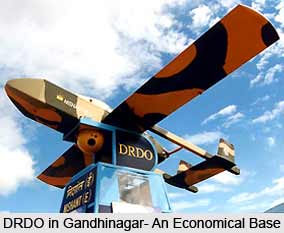 Economy of Gandhinagar district depends on services in the public sector, Electrical and Electronics, Textiles, Ceramics, Food Processing, and Office Stationery. These are some of the most important vocational and industrial activities in Gandhinagar district. Electronics and Textiles have been the most vital sectors of investment and employment in Gandhinagar district since the late 1980s. The Food Processing industry of the district is well developed because of the nearness to agricultural districts such as Ahmedabad, Mehsana, Sabarkantha, Kheda, Anand, etc. Infrastructure development is another sector that has opened up new opportunities for investment and employment. With the recent rush in investments in the IT/ ITeS sector, Gandhinagar district is more and more shaping into an attractive destination for IT/ ITeS companies.
Economy of Gandhinagar district depends on services in the public sector, Electrical and Electronics, Textiles, Ceramics, Food Processing, and Office Stationery. These are some of the most important vocational and industrial activities in Gandhinagar district. Electronics and Textiles have been the most vital sectors of investment and employment in Gandhinagar district since the late 1980s. The Food Processing industry of the district is well developed because of the nearness to agricultural districts such as Ahmedabad, Mehsana, Sabarkantha, Kheda, Anand, etc. Infrastructure development is another sector that has opened up new opportunities for investment and employment. With the recent rush in investments in the IT/ ITeS sector, Gandhinagar district is more and more shaping into an attractive destination for IT/ ITeS companies.
Agriculture is also an imperative back bone to the economy of Gandhinagar District. Major food crops, oil seeds and fruits produced in the district include rice, wheat, citrus fruits, ber, guava, castor, rape and mustard, pomegranate, papaya, etc. Vegetable crops such as potato, brinjal, cabbage, okra, tomato, cauliflower, cluster bean and cow pea, etc. are cultivated in the district. Gandhinagar district produces almost 8 percent of the total flower crops in the State of Gujarat. It accounts for almost 15 percent of marigold production in the state.
There are at present three hundred and thirty medium and large scale industries in Gandhinagar district, most of which are concentrated in the Kalol Taluka. There are approximately eight thousand small scale industries (SSIs) in Gandhinagar which provide employment to over 36,000 persons. Textiles, Wood products, Mineral based industries and Engineering are the major small scale industries sectors of the district. Textile sector has concerned investments to the tune of INR 1,456 crore which is the highest among investments in all the sectors in the district. Mineral-based industries such as non-ceramic brick industry offer employment to about 64 percent of the manpower working in SSI sector.
New sectors such as agricultural machinery, industrial instruments, leather and leather goods and infrastructure projects have witnessed good investments in recent years. Office stationery and household goods have also witnessed a major surge in investments over the previous decade. Miscellaneous machinery, engineering and ceramics are other promising sectors in the district.






